外研版(2019) 必修第三册 Unit 1 Knowing Me, Knowing You Developing ideas课件(20张)
文档属性
| 名称 | 外研版(2019) 必修第三册 Unit 1 Knowing Me, Knowing You Developing ideas课件(20张) | 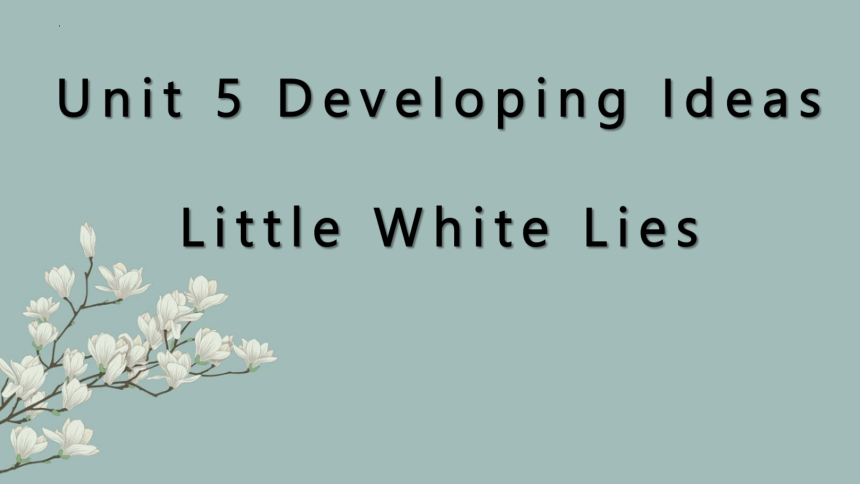 | |
| 格式 | zip | ||
| 文件大小 | 1.4MB | ||
| 资源类型 | 教案 | ||
| 版本资源 | 外研版(2019) | ||
| 科目 | 英语 | ||
| 更新时间 | 2022-06-01 07:39:44 | ||
图片预览

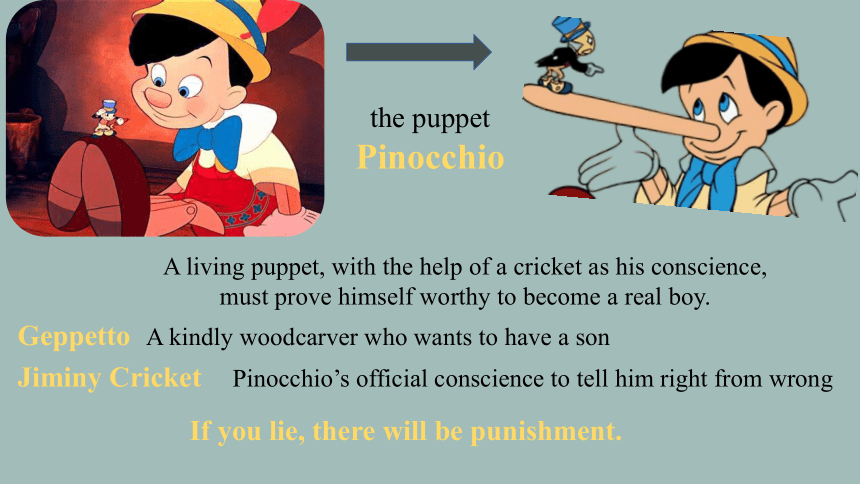
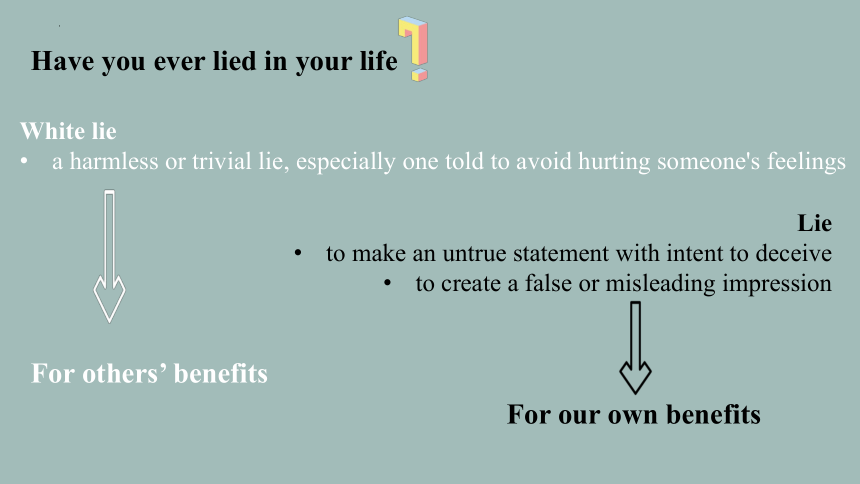
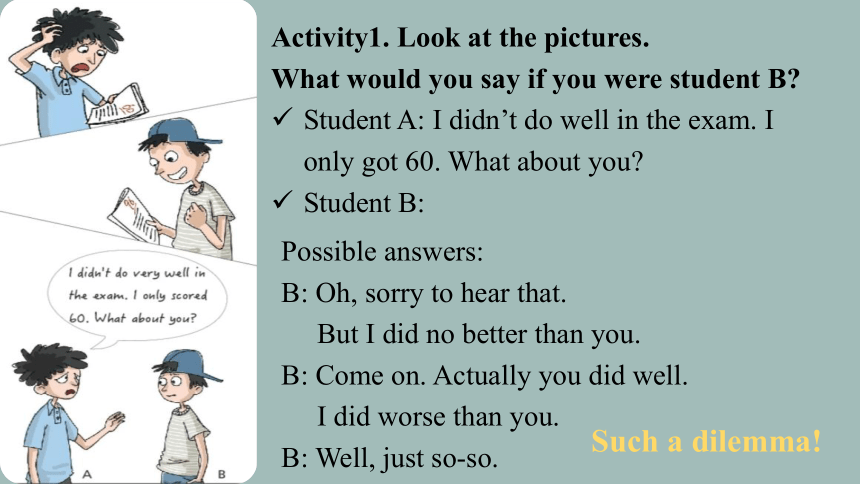
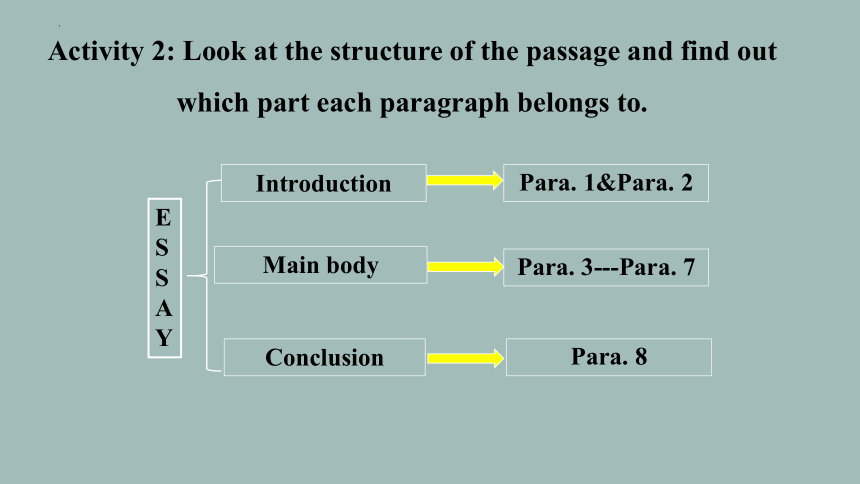
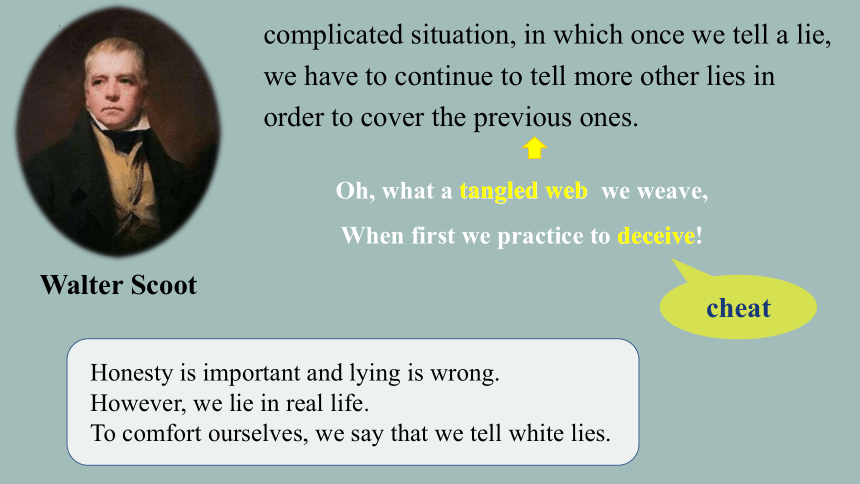
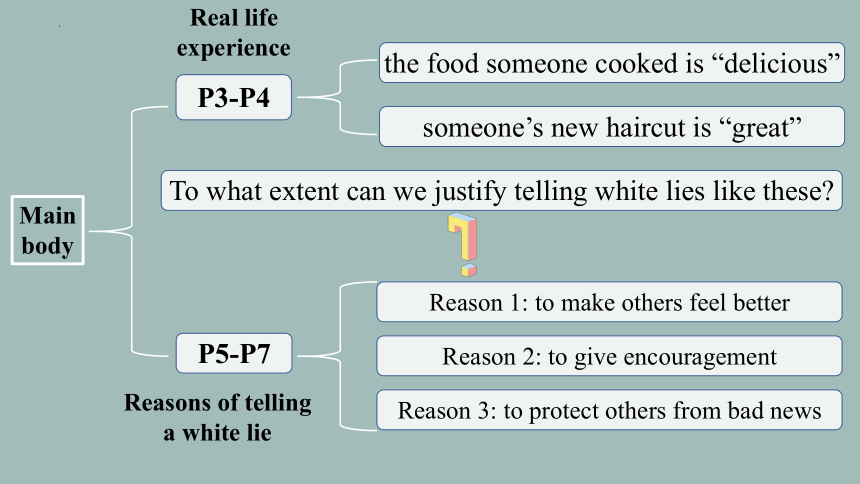
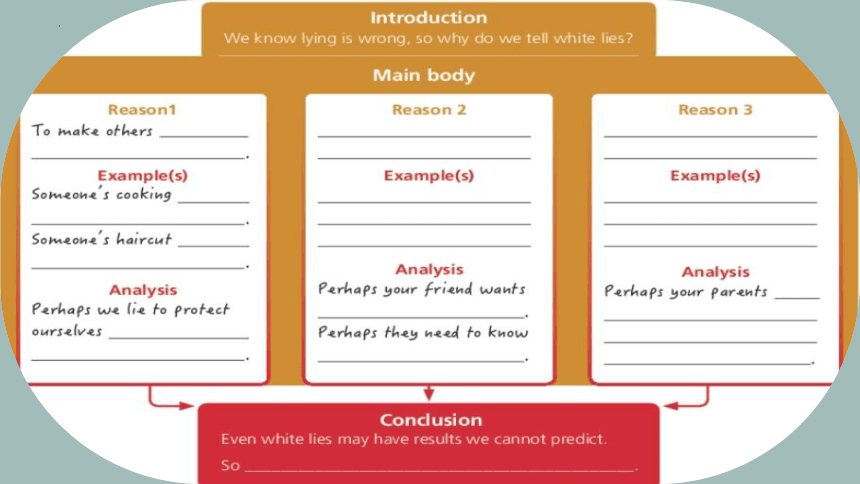
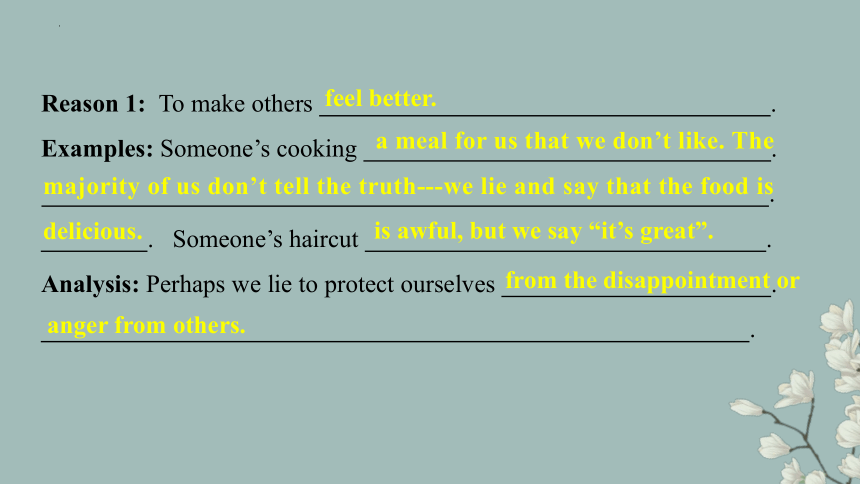
文档简介
(共20张PPT)
Unit 5 Developing Ideas
Little White Lies
the puppet Pinocchio
Geppetto A kindly woodcarver who wants to have a son
Jiminy Cricket Pinocchio’s official conscience to tell him right from wrong
A living puppet, with the help of a cricket as his conscience,
must prove himself worthy to become a real boy.
If you lie, there will be punishment.
Have you ever lied in your life
White lie
a harmless or trivial lie, especially one told to avoid hurting someone's feelings
Lie
to make an untrue statement with intent to deceive
to create a false or misleading impression
For others’ benefits
For our own benefits
Activity1. Look at the pictures.
What would you say if you were student B
Student A: I didn’t do well in the exam. I only got 60. What about you
Student B:
Possible answers:
B: Oh, sorry to hear that.
But I did no better than you.
B: Come on. Actually you did well.
I did worse than you.
B: Well, just so-so.
Such a dilemma!
Activity 2: Look at the structure of the passage and find out
which part each paragraph belongs to.
ES
SAY
Main body
Conclusion
Introduction
Para. 1&Para. 2
Para. 3---Para. 7
Para. 8
cheat
complicated situation, in which once we tell a lie,
we have to continue to tell more other lies in order to cover the previous ones.
Oh, what a tangled web we weave,
When first we practice to deceive!
tangled web
deceive
Walter Scoot
Honesty is important and lying is wrong.
However, we lie in real life.
To comfort ourselves, we say that we tell white lies.
Main
body
P3-P4
P5-P7
Real life experience
Reasons of telling
a white lie
the food someone cooked is “delicious”
someone’s new haircut is “great”
Reason 1: to make others feel better
Reason 2: to give encouragement
Reason 3: to protect others from bad news
To what extent can we justify telling white lies like these
feel better.
a meal for us that we don’t like. The majority of us don’t tell the truth---we lie and say that the food is delicious.
is awful, but we say “it’s great”.
from the disappointment or
anger from others.
Reason 1: To make others .
Examples: Someone’s cooking .
.
. Someone’s haircut .
Analysis: Perhaps we lie to protect ourselves .
.
Reason 2: .
Examples: .
.
Analysis: Perhaps your friend wants .
. Perhaps they need to know .
To give encouragement.
some frank comments from you so that they can improve.
You say your friend’s singing is wonderful, despite
secretly thinking that your cat can sing better.
that they should look for a different hobby.
Reason 3: .
Example: .
. Analysis: Perhaps your parents .
.
To protect others from bad news.
You have had a bad day, but you hide your tears and lie to your parents that your day was “fine”.
would want to listen to you and understand your feelings.
Conclusion: Even white lies may have results we cannot predict. so,
.
.
we shouldn’t tell lies even if they are white lies.
Honesty is an important value and lying is wrong.
ES
SAY
Main body
Conclusion
Introduction
An essay usually consists of three parts: introduction, main body and conclusion. We start with an introduction and it contains the aims and overviews of the essay. The main body is a series of paragraphs that explore and develop your argument. The conclusion contains a summary of your ideas--- do not introduce any new material here! End your essay by linking your conclusion back to the essay title.
1. What does the “web” in the poem represent
2. What would you do in the situations described in the passage
3. How would you feel if you were told a white lie
Share your experience with the class if this has happened to you.
Think & Share
Give a talk on the importance of honesty following the steps below.
Explain what honesty is.
Give reasons for the importance of being honest.
Support your reasons with examples.
End with your conclusion.
Homework
The Porcupine Dilemma
fable n. 寓言
convey vt. 表达;传达
porcupine n. 豪猪;
boundary n. 边界;分界线=border
dilemma n. [C]左右为难
a situation in which one has to make a difficult choice
between two courses of action, both perhaps equally undesirable.
quill n.刺;大翎毛
ideal adj.理想的 n. 理想;典范
The Porcupine Dilemma
describe vt. 描述viewpoint n. 观点,看法point of view 观点in conclusion 总之in short/brief 简言之in a word 总之,简言之
The Porcupine Dilemma
The fable is adapted from a work by ,
which describes that
The fable teaches us that
.
So in our real life, when dealing with our friends, we should respect their privacy.
In conclusion,
Schopenhauer
one cold winter night, a group of porcupines eventually found the ideal distance while managing not to hurt each other with their quills.
For example, we shouldn't read their letters without their permission.
there should be boundaries in interpersonal relationships
only when we keep proper distance can we feel comfortable with each other and our friendship last long as well.
The Porcupine Dilemma
Hercules and the waggoner
A waggoner was once driving a heavy load on a very muddy road.
Suddenly the wheels of the wagon sank into the mire, and the horse could not pull them out. The waggoner threw down his whip. He knelt down and prayed to Hercules. "Hercules, help me,please," he said.
But Hercules appeared to him, and said, "Man, don't kneel there. Get up and put your shoulder to the wheel."
--------------------------------------------------------
大力神与车夫
一名车夫赶着货车沿着一条非常泥泞的小路前行。突然,马车的轮子陷入了泥潭,马无法将它们拉出来。车夫扔下鞭子,跪在地上,祈求大力神出现,"大力神啊,请来帮助我。"他说。大力神出现了,却说:"朋友,用你的肩膀把车轮扛起来,再驱赶马拉车出来。跪在那里祈求我有什么用呢 "
Thank you
for your
listening
Unit 5 Developing Ideas
Little White Lies
the puppet Pinocchio
Geppetto A kindly woodcarver who wants to have a son
Jiminy Cricket Pinocchio’s official conscience to tell him right from wrong
A living puppet, with the help of a cricket as his conscience,
must prove himself worthy to become a real boy.
If you lie, there will be punishment.
Have you ever lied in your life
White lie
a harmless or trivial lie, especially one told to avoid hurting someone's feelings
Lie
to make an untrue statement with intent to deceive
to create a false or misleading impression
For others’ benefits
For our own benefits
Activity1. Look at the pictures.
What would you say if you were student B
Student A: I didn’t do well in the exam. I only got 60. What about you
Student B:
Possible answers:
B: Oh, sorry to hear that.
But I did no better than you.
B: Come on. Actually you did well.
I did worse than you.
B: Well, just so-so.
Such a dilemma!
Activity 2: Look at the structure of the passage and find out
which part each paragraph belongs to.
ES
SAY
Main body
Conclusion
Introduction
Para. 1&Para. 2
Para. 3---Para. 7
Para. 8
cheat
complicated situation, in which once we tell a lie,
we have to continue to tell more other lies in order to cover the previous ones.
Oh, what a tangled web we weave,
When first we practice to deceive!
tangled web
deceive
Walter Scoot
Honesty is important and lying is wrong.
However, we lie in real life.
To comfort ourselves, we say that we tell white lies.
Main
body
P3-P4
P5-P7
Real life experience
Reasons of telling
a white lie
the food someone cooked is “delicious”
someone’s new haircut is “great”
Reason 1: to make others feel better
Reason 2: to give encouragement
Reason 3: to protect others from bad news
To what extent can we justify telling white lies like these
feel better.
a meal for us that we don’t like. The majority of us don’t tell the truth---we lie and say that the food is delicious.
is awful, but we say “it’s great”.
from the disappointment or
anger from others.
Reason 1: To make others .
Examples: Someone’s cooking .
.
. Someone’s haircut .
Analysis: Perhaps we lie to protect ourselves .
.
Reason 2: .
Examples: .
.
Analysis: Perhaps your friend wants .
. Perhaps they need to know .
To give encouragement.
some frank comments from you so that they can improve.
You say your friend’s singing is wonderful, despite
secretly thinking that your cat can sing better.
that they should look for a different hobby.
Reason 3: .
Example: .
. Analysis: Perhaps your parents .
.
To protect others from bad news.
You have had a bad day, but you hide your tears and lie to your parents that your day was “fine”.
would want to listen to you and understand your feelings.
Conclusion: Even white lies may have results we cannot predict. so,
.
.
we shouldn’t tell lies even if they are white lies.
Honesty is an important value and lying is wrong.
ES
SAY
Main body
Conclusion
Introduction
An essay usually consists of three parts: introduction, main body and conclusion. We start with an introduction and it contains the aims and overviews of the essay. The main body is a series of paragraphs that explore and develop your argument. The conclusion contains a summary of your ideas--- do not introduce any new material here! End your essay by linking your conclusion back to the essay title.
1. What does the “web” in the poem represent
2. What would you do in the situations described in the passage
3. How would you feel if you were told a white lie
Share your experience with the class if this has happened to you.
Think & Share
Give a talk on the importance of honesty following the steps below.
Explain what honesty is.
Give reasons for the importance of being honest.
Support your reasons with examples.
End with your conclusion.
Homework
The Porcupine Dilemma
fable n. 寓言
convey vt. 表达;传达
porcupine n. 豪猪;
boundary n. 边界;分界线=border
dilemma n. [C]左右为难
a situation in which one has to make a difficult choice
between two courses of action, both perhaps equally undesirable.
quill n.刺;大翎毛
ideal adj.理想的 n. 理想;典范
The Porcupine Dilemma
describe vt. 描述viewpoint n. 观点,看法point of view 观点in conclusion 总之in short/brief 简言之in a word 总之,简言之
The Porcupine Dilemma
The fable is adapted from a work by ,
which describes that
The fable teaches us that
.
So in our real life, when dealing with our friends, we should respect their privacy.
In conclusion,
Schopenhauer
one cold winter night, a group of porcupines eventually found the ideal distance while managing not to hurt each other with their quills.
For example, we shouldn't read their letters without their permission.
there should be boundaries in interpersonal relationships
only when we keep proper distance can we feel comfortable with each other and our friendship last long as well.
The Porcupine Dilemma
Hercules and the waggoner
A waggoner was once driving a heavy load on a very muddy road.
Suddenly the wheels of the wagon sank into the mire, and the horse could not pull them out. The waggoner threw down his whip. He knelt down and prayed to Hercules. "Hercules, help me,please," he said.
But Hercules appeared to him, and said, "Man, don't kneel there. Get up and put your shoulder to the wheel."
--------------------------------------------------------
大力神与车夫
一名车夫赶着货车沿着一条非常泥泞的小路前行。突然,马车的轮子陷入了泥潭,马无法将它们拉出来。车夫扔下鞭子,跪在地上,祈求大力神出现,"大力神啊,请来帮助我。"他说。大力神出现了,却说:"朋友,用你的肩膀把车轮扛起来,再驱赶马拉车出来。跪在那里祈求我有什么用呢 "
Thank you
for your
listening
